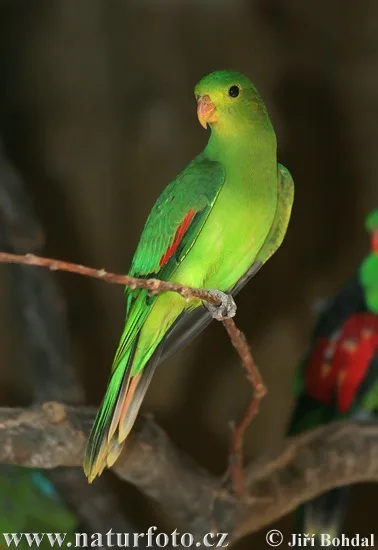
Red-winged Parrot
[order] PSITTACIFORMES | [family] Psittacidae | [latin] Aprosmictus erythropterus | [authority] Gmelin, 1788 | [UK] Red-winged Parrot | [FR] Perruche erythroptere | [DE] Rotflugel-Sittich | [ES] Papagayo Alirrojo | [NL] Roodvleugelparkiet | [copyright picture] Jiri Bohdal
Subspecies
Monotypic species
Genus
Aprosmictus is a genus of parrots in the Psittacidae family. Several former members, including the Australian King Parrot are now placed in the genus Alisterus. Red-winged parrots are native to Australia and Papua New Guinea. They are green plumaged with red wings, red on the primaries. They are the only parrot to eat upside down, and are known to be aggressive.
Physical charateristics
The Red-winged Parrot is a medium-sized, stout parrot and is the only mainly green parrot with large red shoulder patches. The male is bright lime green with a black back and deep blue rump. The tail is green with a yellow tip. The bill and eye are red and the legs are grey. The female is similar, but with a smaller wing patch and dark green back and a paler rump. Red-winged Parrots are usually seen in pairs or flocks. Their flight is distinctive, with deep, full strokes and a light and airy quality, pausing on each stroke. This species is also known as Crimson-winged or Red-winged Lory, Red Wing or King Parrot.
Listen to the sound of Red-winged Parrot
[audio:https://planetofbirds.com/MASTER/PSITTACIFORMES/Psittacidae/sounds/Red-winged Parrot.mp3]
Copyright remark: Most sounds derived from xeno-canto
recorded by Peter Woodall
| wingspan min.: | 0 | cm | wingspan max.: | 0 | cm |
| size min.: | 30 | cm | size max.: | 32 | cm |
| incubation min.: | 20 | days | incubation max.: | 22 | days |
| fledging min.: | 33 | days | fledging max.: | 37 | days |
| broods: | 1 | eggs min.: | 3 | ||
| eggs max.: | 5 |
Range
Australasia : North, East Australia, South New Guinea. Red-winged Parrots are widespread in northern and eastern Australia and are also found in southern New Guinea and Irian Jaya.
Habitat
Red-winged Parrots are found in open, dry woodlands, timber-lined watercourses and arid scrub and sometimes in mangroves. They spend most of the day in trees.
Reproduction
Red-winged Parrots breed once each year. Eggs are laid in the hollow trunk of a tall tree, often near the ground. The nesting tree is usually close to water. The nest site may be a long way down from the entrance, which is high in the tree. Only the female incubates, leaving the nest to feed or to be fed by the male. Breeding season lasts from July to January; Clutch Size is 4 to 6 eggs which are incubated for about 20 days.
Feeding habits
Red-winged Parrots feed on seeds, nectar, pollen and blossoms, insects and larvae. They forage in the canopy on outer branches of flowering trees and shrubs. They occasionally come to the ground to drink or to eat fallen seeds
Video Red-winged Parrot
httpv://www.youtube.com/watch?v=E5_S7x0QC2Y
copyright: Tom Tarrant
Conservation
This species has an extremely large range, and hence does not approach the thresholds for Vulnerable under the range size criterion (Extent of Occurrence <20,000 km2 combined with a declining or fluctuating range size, habitat extent/quality, or population size and a small number of locations or severe fragmentation). The population trend appears to be increasing, and hence the species does not approach the thresholds for Vulnerable under the population trend criterion (>30% decline over ten years or three generations). The population size has not been quantified, but it is not believed to approach the thresholds for Vulnerable under the population size criterion (<10,000 mature individuals with a continuing decline estimated to be >10% in ten years or three generations, or with a specified population structure). For these reasons the species is evaluated as Least Concern.
The global population size has not been quantified, but the species is reported to be generally common and locally abundant. The population is suspected to be in decline owing to ongoing habitat destruction.
The global population size has not been quantified, but the species is reported to be generally common and locally abundant. The population is suspected to be in decline owing to ongoing habitat destruction.

Migration
The movements of Red-winged Parrots are not well known. They are considered partly nomadic in response to local conditions, searching for food and water.
Distribution map

